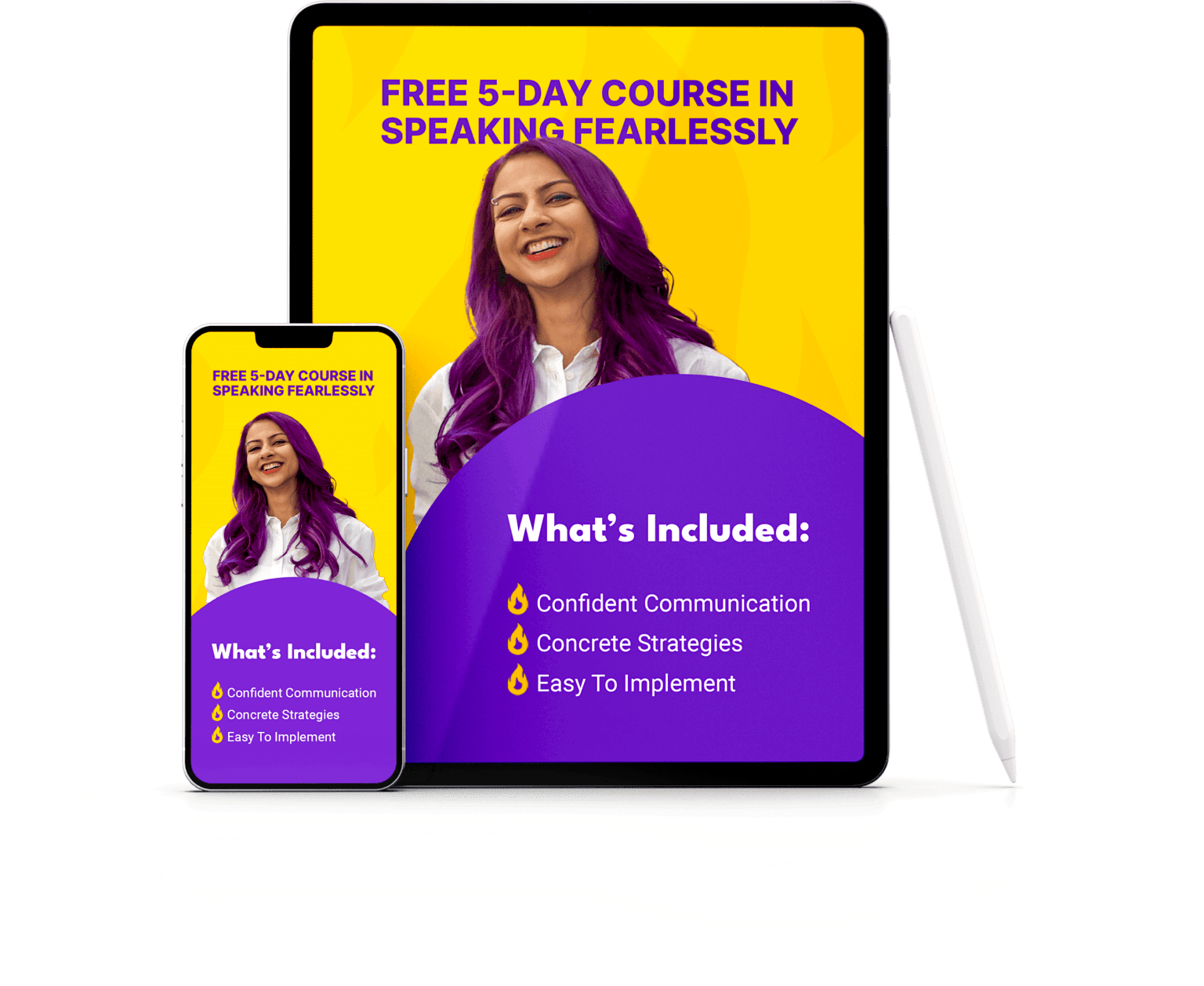When you’re an entrepreneur, you’re likely working on something very specialized.
Most likely you have expert-level knowledge in your field. However, just because you have expert-level knowledge – that doesn’t mean you necessarily know how to communicate it with impact when you speak.
Ironically – being able to communicate your vision, energize resources and share decisions, you need to be an above-average speaker. Through improving your public speaking skills, you will be able to convey your ideas with ease, build critical connections and influence others.
In this comprehensive guide, we will explore the nuanced intersection of public speaking and entrepreneurship, offering actionable tips rooted in both communication expertise and psychological insights.
Table of Contents
Understanding the Entrepreneurial Mindset: A Psychological Foundation

Photo by Anna Shvets
I’ll take a bold stance here: Most entrepreneurs aren’t just in it for the money. The entrepreneurial mindset is about embracing innovation, building resilience and drive change in some way.
The first step on your public speaking journey is to recognize your current strengths – you already have passion for your work, you already take big risks and you’re already goal-oriented. Your aim should not be just to improve your public speaking skills- it should be to effectively convey these specific qualities in all your presentations, talks and podcast appearances.
Once the audience sees those distinct qualities in your talk, they will perceive you as an authentic voice and will be able to connect with you and your vision.
Crafting a Compelling Narrative: Your Entrepreneurial Story
You have an origin story. There was a point in time that you started your business – and a reason attached to it. The first thing you should do as part of your endeavor to become a better speaker is to have stories to tell.
And your origin story is one of the best stories you can tell. This not only inspires people within the company but also shares your raison d’etre – reason for being – with external audiences. And bonus win: potential clients will be more likely to feel empathy and resonance with you and your mission once they hear about why you’re doing what you’re doing. A strong origin story is also, finally, at the heart of every fundraising effort.

Image by pch.vector on Freepik
Use these tips to craft your origin story:
- Share your background.
- Talk about your key decisions leading up to the creation of your company.
- Share the challenges you’ve overcome, the triumphs you’ve celebrated.
- Share a turning point in your career/journey that became pivotal to leading you to where you are now.
- Include the vision propelling your venture forward.
A compelling origin story not only humanizes you but also establishes an emotional connection with your audience, fostering trust and engagement.
Using the Power of Storytelling
Don’t just stop at your origin story. Storytelling is a powerful tool that you can use to illustrate a point, get attention, and be remembered.
This is exactly how:
- Do some brainstorming sessions with yourself where you write down the major stories of your life.
- Now write down all the values you want to stand for and the key messages you want to integrate in your talks.
- Link the two. Choose stories from your life that can be linked to the key messages you want to communicate and stand for.
These are your stories that you’ll tell over and over. These are the stories people will start associating with you. These are the stories you’ll become known for.

Identify what you want to be known for
Authenticity is the currency of connection. But what is it to be authentic?
You are a slightly different version of yourself with different people in your life and in different situations. So the best thing you can do for your personal brand is to identify what are the key parts of your personality you want to showcase publicly, especially when speaking.
This will enable you to add flavor and personality to your presentations, to your LinkedIn posts and to your videos and podcasts. People like memorable personalities and they associate a display of personality as “authentic”. And when you’re perceived as authentic, you build credibility and authority.
So it’s up to you to shape your own impression.
Mastering the Art of Confidence
You are sure of your business proposition, your product/service and the value you bring to your audience.
But people need to see that confidence when you speak. Being confident doesn’t mean being arrogant, or never being nervous. Confidence means an easy, relaxed vibe. Confidence means being able to share your key messages without feeling flustered, talking too fast or not feeling like you’re in control.

Image by storyset on Freepik
The key to confidence is:
- Building your speaking skills.
- Practicing your message to the point where you know it inside out.
- Creating intentional positive feedback loops in your self-talk where you emphasize your strengths and accomplishments.
Nervousness is a natural part of public speaking. Rather than seeing it as a hindrance, learn to transform your anxiety into energy. Acknowledge your nerves, reframe them as excitement, and leverage this heightened state to fuel passionate and energetic delivery.
Confidence inspires confidence – so when you’re confident, you signal to your audience to be confident in you.
Read more about strategies to build your confidence:
From Nervous Rookie to Confident Public Speaker – One lesson I’ll always remember!
Engaging Your Audience: The Entrepreneur’s Guide to Captivation
A lot of people get this dead wrong: they think of presentations and talks as one-way conversations. This only leads to boring, soporific presentations that people can’t wait to get out of.
The key to capturing your audience’s attention is to engage them as much as possible. For your presentations, plan to engage the audience with a question, a poll or a joke every 4-5 minutes. For your podcasts, ask the audience questions as if you’re having a 1:1 conversation with them.

Image by wavebreakmedia_micro
Here are some tips to build audience engagement:
- Share a quote and ask if they agree.
- Ask a simple yes/no question and ask them to raise their hands.
- Tell a joke and wait for them to laugh.
- Show them data and ask for a poll. Ask them to raise their hands one by one for each poll response. Watch-out: Don’t have too many options or this might become tedious.
- If you’re feeling really bold, ask someone in the audience to be a volunteer and have them up on stage to share a case study or do an interaction.
Adaptability: A Vital Skill for Entrepreneur Speakers
When you’re facing tech issues, tell a joke about technology.
When the audience doesn’t seem engaged, do an audience engagement exercise.
When you don’t feel good afterwards, document and reflect on why.
Your biggest strength as an entrepreneur is your adaptability and resilience. Use the same strength in your public speaking opportunities.

Image by yanalya on Freepik
Be ready to pivot in response to audience reactions or unexpected situations. This flexibility and adaptability will pay off when people remember your talk for months or years afterwards – because you did what 99% of the other speakers don’t do.
Handling Q&A Sessions with Charisma and Authority
The Q&A session is an opportunity to showcase your expertise and composure.
Depending on the environment – whether you’re presenting to a board of directors or your Toastmasters buddies – you might get a lot of unexpected questions. Here’s how to manage an effective Q&A session:
- Share expectations for Q&A at the start – do you want to handle questions as they come up or do you want the audience to only ask questions at the end?
- Keep to one question per person – if someone tries to engage in a back and forth, politely say that you’d love to connect with them after the talk but you’d like to give others a chance to ask questions.
- Don’t let unexpected questions fluster you – if you don’t know the answer, share how the participant might find the answer themselves (e.g. “You could ask an expert in XYZ for this, who might have more insights to share”).

Image by mego-studio on Freepik
Strategic Networking through Public Speaking: Building Your Tribe
Public speaking is not just about delivering a message; it’s a networking goldmine for entrepreneurs.
When I started building my video production startup in China, I knew almost no one as I’d just moved there.
My key strategy was to attend networking events and build my own network through getting to know key resources. Eventually I started speaking at events and also created my own workshops. The people I got connected to through these events ended up becoming my go-to resources for film production, marketing and business development. I also got tons of referrals this way.
You can leverage speaking engagements to build trustworthy relationships, connect with potential collaborators, and expand your tribe. Once people see you on stage, you get some level of credibility and trust by default. It’s up to you to build on that trust and keep that relationship going.
Continuous Improvement: Growing as a Public-Speaking Entrepreneur
The best way to grow your skills in public speaking is to seek feedback – and also to train yourself to give yourself feedback.
Just like top athletes watch their performance back at a game, get into the habit of reviewing your speaking engagements – whether they’re podcasts, live events or presentations.
This way you’ll gain a better understanding of your current strengths and opportunity areas, and will learn to practice strategically next time.
Real-Life Examples: Entrepreneurs Who Mastered the Stage
I like sharing examples of great public speakers with my clients – especially ones that belong to their industries. However, this should be taken with a grain of salt: the goal is not to mimic someone’s style, but to see what kind of tools they’re using to have an impactful presence on stage. How’s their body language? Are they modulating their voice? Do they use pauses effectively?
Once you peel back the curtain on the speaker’s toolkit, it becomes easier to use the same tools in your own way – so that your speaking style and persona remains authentically yours.
If you’re looking for some inspiration, here are 5 of my favorite TED talks by inspiring entrepreneurs and thought leaders:
- The first 20 hours — how to learn anything | Josh Kaufman
- How to stop screwing yourself over | Mel Robbins
- The next Web of open, linked data | Tim Berners-Lee
- How great leaders inspire action | Simon Sinek
- The single biggest reason why start-ups succeed | Bill Gross
Innovative Platforms: Beyond Traditional Speaking Engagements
Public speaking isn’t just about speaking on a big stage.
The best way to practice your speaking skills as an entrepreneur is to seek non traditional opportunities and speaking engagements like being on podcasts, doing webinars, and LinkedIn Live events.
These opportunities are a win-win: you get to practice your public speaking tools as well as amplify your brand voice by reaching untapped audiences. Embracing new platforms can enhance your visibility and influence in the entrepreneurial ecosystem.
Cultivating a Personal Brand through Public Speaking
Public speaking of course greatly contributes to your personal brand as an entrepreneur.
A video of you speaking offers so much more data on who you are as a person than text posts on any platform. When potential clients, collaborators and investors see a video of you speaking, they see who you really are, what you talk like, and you become a more familiar face to them.
Speaking in public, and repurposing that content on your socials puts you in the driving seat of your brand creation and lets you leverage every speaking opportunity tenfold. You may have spoken to an audience of hundreds live, but potentially thousands or tens of thousands are seeing a video of that event online. This boosts your visibility as well as your credibility.
It’s crucial now more than ever to stand out as an entrepreneur. Speaking in public, gaining visibility on multiple platforms by sharing your story and strategically integrating your brand messages into your talk will get you there.
Embrace the stage with confidence, and let your words resonate as a force for change and innovation. Want to become a more powerful speaker in 2024? Let’s talk.

